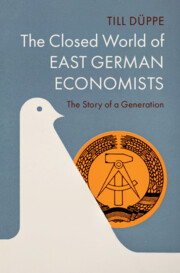Book contents
- The Closed World of East German Economists
- Historical Perspectives on Modern Economics
- The Closed World of East German Economists
- Copyright page
- Epigraph
- Contents
- Figures
- Acknowledgments
- Introduction
- Part I Growing into a Socialist Germany
- Part II Coming of Age during the Thaw
- 3 Staging a Scientific Debate
- 4 Negotiating Socialist Statistics
- Part III Reforming Reforms towards Bailout
- Part IV Letting Go
- Conclusion
- Appendix Overview of Important Institutions Mentioned in Text
- References
- Index
- Series page
4 - Negotiating Socialist Statistics
from Part II - Coming of Age during the Thaw
Published online by Cambridge University Press: 27 April 2023
- The Closed World of East German Economists
- Historical Perspectives on Modern Economics
- The Closed World of East German Economists
- Copyright page
- Epigraph
- Contents
- Figures
- Acknowledgments
- Introduction
- Part I Growing into a Socialist Germany
- Part II Coming of Age during the Thaw
- 3 Staging a Scientific Debate
- 4 Negotiating Socialist Statistics
- Part III Reforming Reforms towards Bailout
- Part IV Letting Go
- Conclusion
- Appendix Overview of Important Institutions Mentioned in Text
- References
- Index
- Series page
Summary
This chapter shows how academia maintained relative autonomy in the face of party interests during the so-called Thaw. A young academic outsider, Ernst Strnad (1928), tried to mobilize, without success, his party relations against the best known senior economists in order to receive a doctoral degree. The question at stake was the status of political economy as an exact science, in particular regarding the role of statistical methods. Considering the significant changes economics experienced in Western countries after the rise of the econometric movement in the 1930s, what would a socialist critique of “bourgeois” statistics look like and what would be the role of quantitative methods in political economy? Strnad’s thesis tackled these questions, but it was written unsolicited without supervision. Facing difficulties in finding academic approval, he tried to mobilize high-party officials in his favor. In spite of the increased party influence, universities were not willing to give up their academic ethos and maintained the traditional mechanism of academic inclusion and exclusion.
- Type
- Chapter
- Information
- The Closed World of East German EconomistsHopes and Defeats of a Generation, pp. 116 - 142Publisher: Cambridge University PressPrint publication year: 2023

